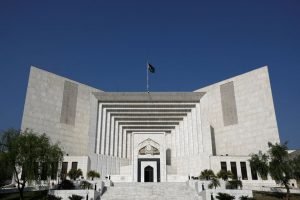Cases that the Supreme Court deems to be “frivolous” will henceforth be subject to fines.
The court has stated that such litigation results in an artificial rise in the number of pending cases and delays the resolution of genuine disputes.

ISLAMABAD: According to the top court, imposing fees or fines would put an end to the “frivolous, vexatious, and speculative litigation” that was unfairly taxing the courts.
When hearing a frivolous case about the granting of a succession certificate for an amount of Rs32,185 left by the deceased father in a bank account, Justice Syed Mansoor Ali Shah wrote a six-page judgement that stated, “[This litigation] gives an] artificial rise to pendency of cases which in turn clogs the justice system and delays the resolution of genuine disputes.”
Justice Syed Mansoor Ali presided over a three-judge panel of the Supreme Court that highlighted that such litigation needed to be eliminated from the system and that one way to do so was to impose fees under Order 28 Rule 3 of the Supreme Court Rules, 1980.
The court further stated that “the threat of being forced to pay actual costs should be such as to make every claimant think twice before putting out a vexatious claim or defence before the court.”
According to the ruling, these expenditures could go above and beyond the minimal ones under the right circumstances.
In addition to the amount of the court charge, process fee, and attorney’s fee paid in connection with the action, they also include the costs of the victorious party’s time spent, any necessary transportation and lodging, and any other incidental expenditures. According to the statement, “[the] imposition of costs in frivolous and vexatious cases meets the requirement of [a] fair trial under Article 10A of the Constitution, as it not only deters frivolous claims or defences from being brought to court, but also [the] absence of such cases allows more court time for the adjudication of genuine claims.”
The SC stated that in addition to encouraging the parties to use ADR procedures and reach a settlement, it also advised against rushing to court.
Costs, it continued, “set the groundwork for swift justice and support a clever judicial system that promotes access to justice by entertaining valid claims.”
In short, the SC stated that fees encouraged settlements between the parties, alternative conflict resolution, and lessened the unneeded burden on the courts so they could focus on legitimate claims.
The verdict stated that “costs are a weapon of offence for the plaintiff with a reasonable claim to present and a shield to the defendant who has been hauled into court unfairly.”
The court pointed out that the phrase “may take cognisance” used in Section 476 of the Criminal Procedure Code indicates that the authority granted to a civil, revenue, or criminal court by that section to take cognizance of certain offences committed in, or in connection with, any proceedings before it, is discretionary.
The court in question must apply this discretion prudently, not arbitrarily, while taking the facts and circumstances of the case into account, the judgement stated.
“Previously, before it was replaced by the Act XXI of 1976, Section 476 had made it clear that the court must act in accordance with that section when it believes that it is necessary for the sake of justice for an investigation into a particular offence to be conducted. We are of the considered opinion that, despite the absence of that phrase in the current Section 476, the court concerned should give primary consideration to the question of whether it is expedient in the interests of justice to take cognisance of the offence when exercising its discretion under this section. This is because discretionary powers must always be used in the interests of justice, according to the judgement.










































